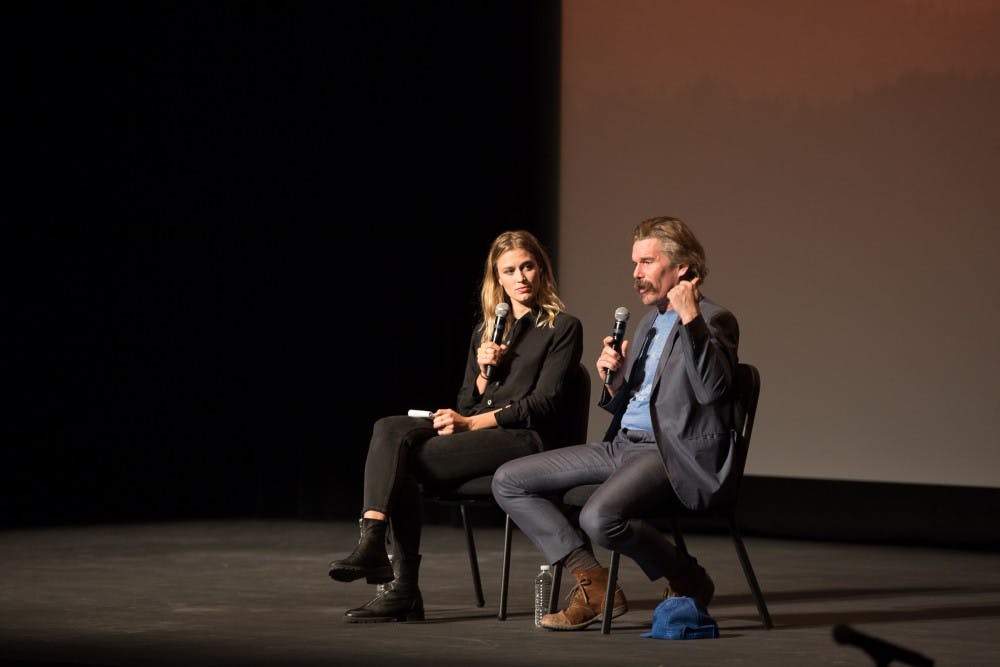When Ethan Hawke took to the stage at The Paramount Theater Saturday afternoon, the crowd expressed a restless excitement. Jody Kielbasa, director of the Virginia Film Festival and vice provost for the Arts, had introduced the actor’s accomplishments — recounting the four Academy Award nominations, a Tony Award nomination and a canon of memorable films to his name. When the man himself appeared onstage to introduce the upcoming screening, his reputation preceded him. But as the program continued, Hawke’s candor and sincerity took centerstage.
“My name is Ethan Hawke and this is my mustache,” he said, clearing the air about the impressive, Civil War era swirl on his lip — he is growing it for his role as John Brown in the upcoming miniseries, “The Good Lord Bird” — before beginning his introduction of the day’s film, the 2007 crime drama “Before the Devil Knows You’re Dead.”
“I love to share this movie with people,” Hawke said before the screening. He would echo the same sentiments in his discussion with Elizabeth Flock of PBS NewHour after the film. It was legendary director Sidney Lumet’s last film, made off the heels — and good will — of Philip Seymour Hoffman’s then-recent Oscar win for 2005’s “Capote.” Hoffman and Hawke co-star in the movie, which tells the story of two brothers who attempt a victimless robbery — and face the consequences of its horrific failure.
Told in time-jumping, perspective-altering sequences and shot on digital, “Before the Devil Knows You’re Dead” has the bleak outlook and frustration of a man eclipsed by an industry. Hawke spoke to this point after the credits rolled.
“[Lumet] would joke all the time that it was easier for him to get a Lifetime Achievement Award than a film made,” Hawke said. “And that was very, very difficult for him. It’s funny and everything — but it's really hard to feel vital and have something to offer.”
When Hawke spoke about his experience with Lumet as a director, the passion in craft of both men shone through.
“People love this idea of the auteur,” Hawke said. “This kind of signature — Sidney hated signatures. He hated anything that was about the ego and about the self. He believed in servicing the story.”
Hawke explained this ethos with an anecdote about how Lumet critiqued one of Hawke’s shots in his directorial debut. When asked how he liked it, Lumet responded “that would be a great shot if it was a movie about a film director. If it’s a film about the characters, you weren’t making me think about them.”
Speaking to his experiences with his colleagues in the film, Hawke gained a tender animation that warmed the heart and had the audience chuckling. The conversation turned a bit more serious when Hawke spoke about his relationship with Hoffman, who died in 2014. Hawke recalled a proclamation Hoffman had made about art during the shooting of the film, and shared it with the audience at the Paramount.
“You can lie all the time in your life … you lie here and you lie there and these little lies they go and they spread everywhere,” Hawke recalled Hoffman saying. “There’s one place — this thing called art, and he drew this circle — and in this thing called art, you have to tell the truth.”
Hawke explained that people — in an audience and in real life — have an aversion to being lied to. It is part of what he called “the great pull to good in the universe.”
“There is a malevolent force at work sometimes in our lives,” Hawke said. “We see it in our politics … we see it in how our planet is treated, the way we’re not the stewards that we want to be … There’s so many ways we’re disappointing … but there’s so many things that are beautiful. There’s love everywhere, and there’s healing everywhere. The earth turns and it wants to heal things.”
Throughout the conversation, Flock probed Hawke about his beliefs and how they translate into upcoming projects. Hawke described his new focus on what he called third-person acting — focusing on the “brass tax of acting” instead of trying to be a monolithic leading man.
“When I was younger I was really very interested in … bringing every character to myself,” Hawke said. “And as I’ve gotten older I’ve gotten much more interested in … building a character.”
In recent years, Hawke has explored characterizations which have shocked and moved a contemplative audience. In 2017’s “First Reformed,” Hawke played a priest struggling with his faith after being confronted by the church and humanity’s complicity with climate change. He brought up this character in relation to his new role of John Brown — which he said made him question “the role of the radical in a community.”
Perhaps the greatest signifier of Hawke’s tenor and candor that afternoon was when he spoke about time. After Flock asked him about his roles in “Boyhood” (2014) — a film Richard Linklater made over the course of 12 years — and the “Before” trilogy — three movies with 18 years in between — Hawke spoke about aging, storytelling and sincerity.
“Movies and art try to take one moment and make it extremely important and represent other moments,” Hawke said. “You know … this is the moment this young woman came of age … it doesn’t actually work like that. Time is working on us, we are a part of time, time is us … simply watching people age is bizarre.”
To end the moderated part of the discussion, Flock asked Hawke about going beyond the individual as an artist. After an afternoon spent reflecting on his career to this point, his words and attitude about the craft rang true.
“If you’re looking for the arts to give back to you, you’re gonna be miserable,” Hawke said. “No matter how much you get, you want more. And if you think how can I give to this — then it gives back to you tenfold, all the time … if you love it, it all becomes real easy.”







